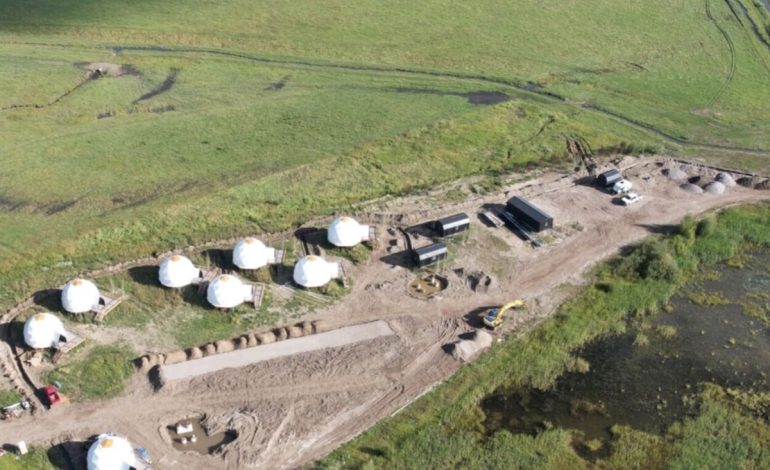Tammah Resort in Teton County Violates State Groundwater Standards, Leading to Septic System Shutdown

Tammah, formerly known as Basecamp, has been issued a formal notice of violation by the Wyoming Department of Environmental Quality (DEQ) after its septic system near Teton Village was found to be leaking wastewater and contaminating nearby groundwater, Northern Wyoming News reports.
The notice, issued on October 29, 2024, follows a year-long battle over the resort’s wastewater system, which critics warned would fail and pollute Fish Creek, a nearby waterway.
The DEQ’s investigation revealed that elevated ammonia levels in nearby groundwater were seven times higher than the state standard, indicating that the septic system was malfunctioning. The facility, located near the resort’s glamping domes, has now been prohibited from using its septic system and is required to haul away waste until a resolution is found.
Tammah’s wastewater treatment facility has been a point of contention ever since its inception. Initially, Basecamp planned to haul away human waste, but the DEQ pushed for a septic system instead, arguing that waste hauling could pose a larger risk of catastrophic failure. However, the system, which was constructed near wetlands, soon faced issues.
Dan Heilig, a board member for Protect Our Water Jackson Hole, expressed frustration with the system’s placement in such an environmentally sensitive area.
“This shouldn’t be a surprise to anyone given that this system was constructed in a wetland area… We need to do a better job of siting and designing small wastewater facilities in the future, especially in the Class 1 Fish Creek watershed,” he said.
Tammah has since taken steps to address the issue, including shutting off septic pumps on November 4 and conducting a thorough review of the facility. The company also resampled the groundwater and discovered that ammonia levels in a new well were within acceptable limits. However, the company’s claim that the ammonia spike was isolated to one well has not fully assuaged concerns.
The Teton County community has been critical of the resort for more than two years, accusing the company of disregarding local water quality concerns. In 2022, the county filed lawsuits against the state over its approval of the development on state trust lands, which are managed to generate revenue for Wyoming’s K-12 schools. Environmental watchdogs like Protect Our Water Jackson Hole have also voiced concerns, arguing that the resort’s wastewater system was improperly built and located too close to wetlands.
In response to these concerns, the DEQ ordered the company to relocate its septic system. Despite this, the DEQ’s monitoring revealed problems with the system, including water pooling around the raised sand mound septic system, a sign that the system was not working as designed. A second round of tests in September revealed alarming ammonia levels, prompting the DEQ’s formal notice of violation.
Ammonia, a nitrogen-based compound, can be harmful to aquatic life when it enters surface water. Fish Creek, which flows into the Snake River, already faces significant water quality issues, including e. coli contamination and nutrient pollution, which contribute to poor conditions for local fish species. The DEQ is in the process of designating the creek as “impaired” by nutrient pollution, which has been linked to the decline of cutthroat trout in the area.
Carlin Girard, Executive Director of the Teton Conservation District, explained that ammonia contamination in groundwater is a major red flag for septic system failure.
“It’s a sign that the system isn’t working properly and isn’t moving toxic compounds from a more harmful state to a less harmful state,” she said.
Despite the violation, Tammah has taken steps to address the issues. The company claims that it has made corrective actions, including repairing aerators inside the septic tanks, fixing leaks, and excavating trenches around the sand mound system to improve drainage. While the DEQ has not yet lifted the restrictions on the septic system, Tammah has expressed a desire to reopen the resort, which had been closed for over a week.
“We now feel that we have addressed all of the issues that were noted by DEQ… We request that we be allowed to operate the sand mound promptly,” Tammah officials wrote in a letter.
However, DEQ officials have yet to comment on whether the company will be permitted to resume use of the septic system.
Teton County officials have criticized Tammah for what they view as a reckless disregard for water quality. Luther Propst, Chair of the Teton County Board of County Commissioners, applauded the DEQ for taking action.
“Basecamp has operated with reckless disregard for water quality, and I’m glad that DEQ has shut down that septic system,” he said.
The resort’s wastewater issues come amid growing concerns about the environmental impacts of development in the area. Fish Creek, a Class 1 water body that is supposed to be protected from degradation, already faces pollution from human waste and nutrient overload. As the DEQ continues to monitor the situation, the future of the Tammah resort and its wastewater system remains uncertain.
For now, the company is under pressure to address the violations and ensure that its operations do not further harm the surrounding environment. The DEQ has given Tammah 20 days to propose corrective actions, followed by another 10 days to submit a detailed report outlining the steps it has taken.








